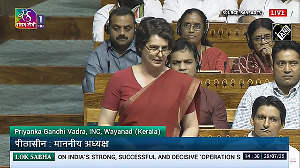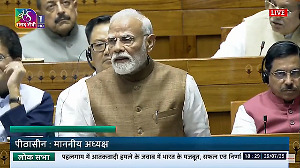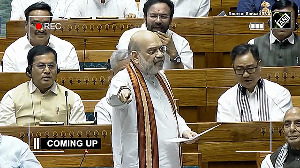Five years after he missed showing Asoka at the Toronto International Film Festival (the print was lost in transit from New York to Toronto on 9/11), Shah Rukh Khan will have the pride of seeing Kabhi Alvida Naa Kehna at the gala section of the festival with the title, Never Say Goodbye.
John Abraham, who became a Toronto heartthrob last year when Water -- starring him and Lisa Ray -- inaugurated the festival, will return with Kabul Express.
The announcement of Kabhi Alvida joining the festival made for some lively headlines: 'Toronto makes song and dance about Bollywood', declared Screen International. "The film marries a Hollywood sensibility to the traditional blockbuster Bollywood appeal," said Noah Cowan, co-director of TIFF, "and ultimately renders a story that examines the full scope of what love has to offer."
Although the Karan Johar-directed film -- which also stars Amitabh Bachchan, Abhishek Bachchan, Rani Mukherji and Preity Zinta -- will be nearing its run in North America by the time the festival opens in Toronto, it will get a special screening. It will be among five Indian films shown at the 31st edition of TIFF that runs from September 7 to 16. Over 300 feature films, documentaries and shorts from more than 50 countries will be shown.
Johar's film joins the premieres of others such as the highly anticipated political drama All the King's Men based on a Pulitzer Prize-winning novel by Robert Penn Warren and directed by Steven Zaillian, who won an Oscar for his screenplay for Schindler's List.
The stars in Johar's film join an impressive list of actors such as Sean Penn, Jude Law, Kate Winslet, Patricia Clarkson, James Gandolfini, Mark Ruffalo, Anthony Hopkins, Susan Sarandon, Ralph Fiennes, Jason Biggs, Isla Fisher, Ed Harris and Diane Kruger, who appear in All the King's Men.
"I wonder if Water would have got so much attention had it not been the inaugural film at the festival," muses Toronto-based director Deepa Mehta. The Hindi-language film got rave reviews, and had a release across Canada on some 150 screens as if it were a mainstream English film. It grossed an impressive US $2 million before opening in America six months later.
In recent years, many Indian filmmakers including Hollywood-based Ashok Amritraj (who had two of his films, Shopgirl and Dreamer, at the fest last year)
have begun declaring TIFF to be their favourite festival. "India is a nation of different cultures and languages, which makes its cinema diverse, dynamic and exciting," Noah Cowan added. "Films in Hindi, Marathi, Telugu and Manipuri will be here, along with several major world premieres from talented new filmmakers."
Making their world premiere at TIFF are three other films, apart from Kabir Khan's Kabul Express: Rajnesh Domalpalli's Vanaja, Chitra Palekar's A Grave-Keeper's Tale and Haobam Paban Kumar's A Cry in the Darkness.
Kabul Express spans 48 hours in the lives of five culturally and politically apart characters in post 9/11 war-torn Afghanistan.
There is politics of another kind in Chitra Palekar's story of a woman condemned to the fringes of her society. Nandita Das, a familiar face to festival attendees with Fire and Earth, stars as Chandi, a wild-haired outcast mercilessly branded a witch by her community. The film is based on the story Baayen (Witch) by one of India's most acclaimed writers, Mahasweta Devi.
Rajnesh Domalpalli's Vanaja is centered on its protagonist, 15-year old Vanaja, who imposes herself on the household of wealthy landlady Rama Devi, an expert at the Kuchipudi dance. Just as she secures her place in the household, Devi's 23-year old son Shekhar returns from America. Inevitably, sexual tension develops between him and Vanaja.
Perhaps the most politically sensitive film from India at TIFF is the docu-drama A Cry in the Dark, set in the period when Manipur became part of India in 1949, amidst the concern of many that the merger was illegal. The film connects the past to the present when a 32-year old woman, taken from her home in 2004 by soldiers of the 17th Assam Rifles regiment, is found dead under suspicious circumstances.
Over the past decade, TIFF has shown some of the best films by Indian directors such as Mani Ratnam and Buddhadev Das Gupta. It has drawn a significant number of films by relative newcomers as Shonali Bose, whose Amu -- a drama set against the Delhi riots that followed Indira Gandhi's assassination -- received excellent reviews last year.
"I think there is hardly a city that truly loves film as Toronto does," Bose tells rediff.com. "There are lines of people at 8 am waiting to watch a film from Bhutan, Argentina, Morocco or India." With over 150,000 people of Indian origin living in and around the city, films from India get a stronger reception than those from other countries, say Chile or Portugal.





